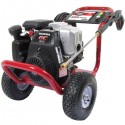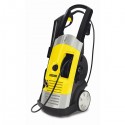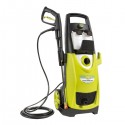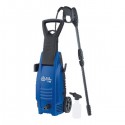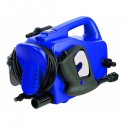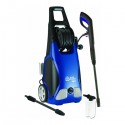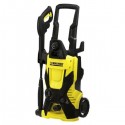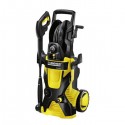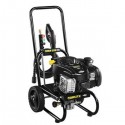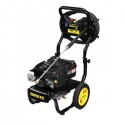Residential Pressure Washer Buying Guide
These are the 10 best residential pressure washers based on product quality, customer satisfaction, and price:
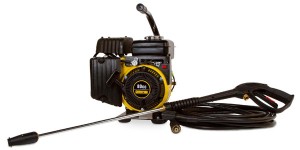 As any homeowner knows all too well, there is no end to the number of cleanup jobs around the house and garden. These range from small jobs to big ones, and when you do them by hand they can seem to take all afternoon – or even all weekend. Wouldn’t it be great if there was an alternative to spending your free time taking care of cleaning jobs without hiring professional help? Well, it turns out that there is – a residential pressure washer can take care of the vast majority of home cleanup jobs in far less time than other methods take. These are affordable, high performance machines that will make sure you can finish your cleaning chores around the home and yard quickly and efficiently and be back to enjoying the rest of your hard earned free time doing what you want.
As any homeowner knows all too well, there is no end to the number of cleanup jobs around the house and garden. These range from small jobs to big ones, and when you do them by hand they can seem to take all afternoon – or even all weekend. Wouldn’t it be great if there was an alternative to spending your free time taking care of cleaning jobs without hiring professional help? Well, it turns out that there is – a residential pressure washer can take care of the vast majority of home cleanup jobs in far less time than other methods take. These are affordable, high performance machines that will make sure you can finish your cleaning chores around the home and yard quickly and efficiently and be back to enjoying the rest of your hard earned free time doing what you want.
With high pressures and flow rates, residential pressure washers are able to tackle just about any job you can think to use them for around the house. Depending on what kind you decide to purchase, you can use them indoors or outdoors. And because there are so many different kinds out there, you will be able to find one that is just right for you. Residential pressure washer designs range from electric to gas powered residential pressure washers; units with very high pressures and heated water sprays to basic models with moderate pressures and just cold water sprays that still perform very well; big, heavy units and units compact enough to carry around with you.
But for this very reason, trying to narrow down the field of available models can be a difficult and fairly confusing task. There is a lot that goes into making the perfect residential pressure washer, and these machines are designed for a variety of tasks. There is a wide range of prices and styles, and it can seem a bit overwhelming when you first start to look at all of the different models. You may even wonder if a residential pressure washer is a good buyer’s choice at all.
But the fact is, buying a residential pressure washer not only makes sound consumer sense, but it is also not that difficult to figure out what product specifications make a good model. Once you have decided on how much money you want to spend on a new residential pressure washer, the rest of the process is actually fairly straightforward.
There are about five basic buying specifications that you can use to determine whether a particular residential pressure washer is the right one for you. By starting with broad characteristics like PSI and flow rate, and narrowing down the field based on what your needs are and what different models are able to offer, you should soon be on your way to a short list of the best models for you. After that, it is really just a matter of deciding how much you are willing to spend and which accessories are right for you.
1. Residential Pressure Washer is a Good Buyer’s Choice
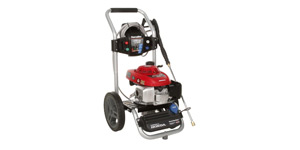 There are a whole lot of reasons why a residential pressure washer is not only a good buyer’s choice, but a great one. The first is the amount of convenience these machines afford their owners. With a residential pressure washer in your garage, there is practically no end to the number of tasks you can get done very quickly and efficiently with it. Once you have seen how effective a residential pressure washer is at taking care of tough cleanup jobs, you will be eager to use it on just about any cleaning chore you can think of – inside your house or out in your yard.
There are a whole lot of reasons why a residential pressure washer is not only a good buyer’s choice, but a great one. The first is the amount of convenience these machines afford their owners. With a residential pressure washer in your garage, there is practically no end to the number of tasks you can get done very quickly and efficiently with it. Once you have seen how effective a residential pressure washer is at taking care of tough cleanup jobs, you will be eager to use it on just about any cleaning chore you can think of – inside your house or out in your yard.
Residential pressure washers provide you with options in almost every area you could think to apply them to. For example, in all likelihood you own a car or SUV, and when you want to keep it looking clean and shiny, you have one of two options: take it to a professional or coin-operated car wash, or clean it in your driveway using the garden hose. Well, a residential pressure washer is better than any of these options.
When you can wash your car in your own driveway, you will wind up saving hundreds of dollars each year on car washes. That is why so many of us do it. But a garden hose only can go so far. You still need to have a bucket of soapy water ready to go. Or, if you do not want to use that slow and labor intensive method, you can do it yourself by taking your car or SUV to a coin-operated car wash, where you still have to pay to do all of the work yourself. What if I told you that a residential pressure washer has – at minimum – three times the cleaning power of the machines at a coin-operated car wash?
Not only that, but on the vast majority of residential pressure washers, you can siphon soap or detergent right into the machine itself, and distribute it over your car along with the high pressure spray of water. No more soaping down the car by hand and then rinsing it off with the garden hose. No more scrubbing mud and stains off of the wheels and sides of the SUV. With a residential pressure washer, you can blast dirt away with a soapy spray, and then switch over to just water to rinse the car down. Your car will be looking like it was professionally cleaned in a matter of minutes, and with little effort on your part.
And if your car has left an ugly grease or oil stain in your driveway or on the floor of the garage, you can use your residential pressure washer to finally wash that out as well. With a powerful chemical solvent in the detergent reservoir and the PSI setting dialed up as high as it will go, stains like this are no match for a residential pressure washer.
Then there is the house. You can spray down vinyl or aluminum siding and brick facades with a residential pressure washer, removing years of seasonal dirt and grime and making your house look just as beautiful as it was when you first bought it. Mold, grit – you name it – a residential pressure washer can handle all of it. Fences, walls, and the garage – there is no limit to what kind of surfaces a residential pressure washer can get clean in a matter of minutes. And if you are thinking of selling your house, cleaning it thoroughly with a residential pressure washer can help to boost the asking price to several times the cost of the machine.
You can even use a residential pressure washer to clean the windows on your house – without having to get up on a ladder or take the storm windows down to do so. Just set the residential pressure washer on one of its lower PSI settings, and you can remove grime and stains from your second story windows while your feet are planted firmly on the ground. Window screens are just as easy to clean with a residential pressure washer.
Around the yard, there are plenty of applications for a residential pressure washer. I like to use mine to keep my gardening tools as clean as the day I first bought them, even though I have been using them to turn over thick loam for years now. I just spray off excess soil and mud when I am done gardening or before I put them away for the winter.
My lawn furniture still is as pristine as it was when I first bought it, because I give it all a seasonal cleaning with a residential pressure washer. It removes bird poop and grass stains in seconds. And my grill is always looking great – whenever it starts looking used and dirty, I give it a good cleaning with my residential pressure washer.
And depending on what kind of residential pressure washer you decide to buy, you may have the option to use it indoors as well where it can be just as useful. If there is tough mold buildup in your shower tiles, a high powered soapy spray may be just what you need to take care of it. And there are plenty of uses in other parts of the house as well.
So you can see why a residential pressure washer is a good buyer’s choice – in a word, it is options. One of these machines gives you so many additional options for cleaning jobs around the house and yard that it is a wonder everyone does not own one. With a residential pressure washer, you will never have to rely on plain old elbow grease and scrubbing power again – one of these machines can easily do all of the work for you. When you have a residential pressure washer in your garage, there is no job too big or too small for it. And once you own one, you will see why this is true.
2. Buying Specifications
2a. High PSI and Flow Rate
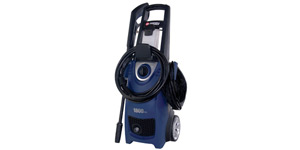 Whenever you are buying any new pressure washer, including residential models, the PSI and flow rate are definitely the first specifications you should be concerned with. That is because these two specs are what determine the overall cleaning ability of the machine. The PSI – or pounds per square inch – determine how much force the water spray will be hitting a surface with. Higher PSI is better able to quickly blast away tough stains. On residential pressure washers the PSI range starts at about 1200 and can go as high as 2500, depending on the power source. Higher is definitely better.
Whenever you are buying any new pressure washer, including residential models, the PSI and flow rate are definitely the first specifications you should be concerned with. That is because these two specs are what determine the overall cleaning ability of the machine. The PSI – or pounds per square inch – determine how much force the water spray will be hitting a surface with. Higher PSI is better able to quickly blast away tough stains. On residential pressure washers the PSI range starts at about 1200 and can go as high as 2500, depending on the power source. Higher is definitely better.
But you should not consider PSI all by itself – the flow rate is also very important. Measured in gallons per minute, the flow rate determines how wide the diameter of the spray with the highest PSI will be. It’s no good to be blasting away at 2500 PSI if the spray is only as wide as a pencil. So take the PSI and flow rate, multiply them by one another, and you get the real cleaning power of a residential pressure washer. You want the machine that has the highest cleaning power rating, because it will provide the most effective cleaning experience.
2b. Dependable Power Source That Can Get the Job Done
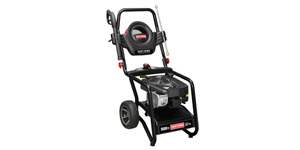 But you do not only want a machine with a high PSI and flow rate – you want to make sure it has a power source that can support it under tough conditions. Residential pressure washers can have two power sources: electric and gas. There are advantages to each kind.
But you do not only want a machine with a high PSI and flow rate – you want to make sure it has a power source that can support it under tough conditions. Residential pressure washers can have two power sources: electric and gas. There are advantages to each kind.
Gas powered residential pressure washers tend to have more cleaning power than electric models do. They also have the advantage that you are not tethered to a power source with them – you can take a gas powered model anywhere you like without worrying about whether there is an electrical outlet nearby.
But electric residential pressure washers have their advantages as well. They are generally able to provide comparable PSI and flow rates to gas powered models, and they have the added advantage that they do not produce any emissions. Not only is this much better for the environment – and it will reduce your household’s overall carbon footprint – but it also means you can use an electric residential pressure washer in enclosed spaces or even indoors without having to worry about harmful fumes. So you will have to decide whether you want additional power and range, or a machine that does not produce any emissions.
2c. High Quality Parts that Will Stand Up to Tough Jobs
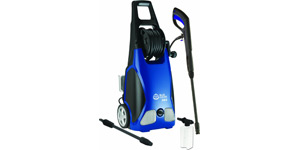 You also want to make sure your residential pressure washer is not going to be made of the kind of parts that will not stand up to repeated use and tough jobs over the long term. These machines are not cheap, and so you need to be confident that you are making an investment in a product that is made of quality materials.
You also want to make sure your residential pressure washer is not going to be made of the kind of parts that will not stand up to repeated use and tough jobs over the long term. These machines are not cheap, and so you need to be confident that you are making an investment in a product that is made of quality materials.
Many residential pressure washers have plastic bodies. This is fine so long as the plastic is a heavy duty composite material that will not break or crack easily. But steel bodies – even if they are made of stamped steel – will always be more durable than plastic ones.
At the very least, you should make sure that the connectors where the intake and outflow hoses link up are made of brass. All too many residential pressure washers have plastic connectors, and these will tend to develop leaks over time, which is something you do not want. You can always replace plastic fittings with brass ones yourself, but you really should not have to do this.
The hose on the residential pressure washer should be made of PVC plastic, and the wheels and other components should also be made of composite materials, if not something stronger.
2d. A Smaller Footprint is Easier to Use
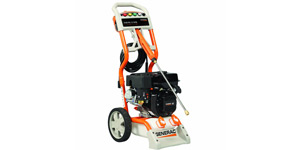 It can be tempting to try to find the biggest residential pressure washer out there, but I would generally tend to advise against doing that. There are a few reasons for this. First of all, you want a machine that is compact enough that you can fit it easily onto a shelf or a tight space in your garage – if your garage is like mine, then storage space doesn’t come easily for new appliances. You also want to be able to throw your residential pressure washer in the trunk of your car if you need to take it over to a friend’s house or offsite to wash your boat down.
It can be tempting to try to find the biggest residential pressure washer out there, but I would generally tend to advise against doing that. There are a few reasons for this. First of all, you want a machine that is compact enough that you can fit it easily onto a shelf or a tight space in your garage – if your garage is like mine, then storage space doesn’t come easily for new appliances. You also want to be able to throw your residential pressure washer in the trunk of your car if you need to take it over to a friend’s house or offsite to wash your boat down.
You also do not want your residential pressure washer to be so heavy that it is difficult to move around or hard to take down from an upper shelf. Heavy machines can be a real pain to try to operate, especially if your strength level is not what it used to be. Furthermore, a machine that is compact and lightweight is often better designed than a heavy, bulky one with the same PSI and flow rate, so this is a good indicator of poor quality design and materials. Go for the compact, lightweight one.
2e. It’s All About the Small Details
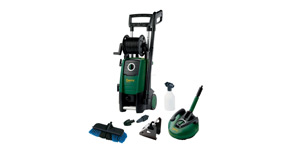 Finally, you have to look closely at the various accessories and other small features that you might otherwise be inclined not to notice if you are only paying attention to things like the machine’s PSI and flow rate. While those are certainly very important, the little details are what are going to make all the difference between a versatile, easy to use machine and one that is simply powerful. Remember, you want options.
Finally, you have to look closely at the various accessories and other small features that you might otherwise be inclined not to notice if you are only paying attention to things like the machine’s PSI and flow rate. While those are certainly very important, the little details are what are going to make all the difference between a versatile, easy to use machine and one that is simply powerful. Remember, you want options.
Make sure that the residential pressure washer has at the very least some kind of siphon intake for soap. It is much better if it has onboard reservoirs (and two are better than one) that you can simply fill up with soap and move around with you as you clean big jobs. If you can find a model with a hot water as well as cold water option, even better.
The hose – and if it is electric, the power cord – should each be at least 20 feet long. You want a free range of motion around the pressure washer while you are working on your car or other jobs. The machine should have big wheels that make it easy to move around with you and also provide good traction and stability on slippery surfaces.
These are the 10 best residential pressure washers based on product quality, customer satisfaction, and price:

